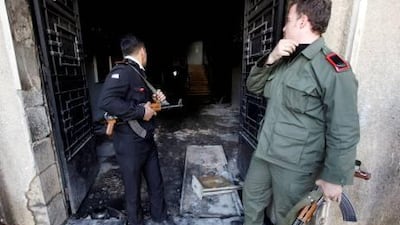DAMASCUS //Anti-government protests in Deraa , Syria continued for a fourth day yesterday, with thousands of demonstrators once again taking to the streets in defiance of a security clampdown that has seen at least five civilians killed and dozens arrested.
The funeral procession for Raed Akrad, shot dead during Sunday's unrest, attracted thousands of residents who marched through the city shouting "no more fear" and demanding a "revolution", according to witnesses. Activists also said that an 11-year-old boy, Mundhir Masalmi, died yesterday morning as a result of inhaling tear gas, which was used widely during Sunday's clashes between protesters and security forces.
There was no official comment on the claim from authorities, who have also not commented on the shooting of Akrad.
Units of riot police, in heavy presence yesterday, dispersed the crowds without a repeat of the violence that has bloodied previous days in Deraa, 100km south of Damascus, although reports from the city indicated the situation remained extremely tense.
"Deraa has been divided in two by the security services, and people are not allowed to cross from one section to the other, in order to stop large crowds gathering," a civil-rights activist said.
There were also signals that the unprecedented outpouring of dissent may be spreading. In Jasim, 45km from Deraa, hundreds of residents shouting "God, Syria, freedom" marched to the village centre where they met with no response from the security forces, according to one activist.
He said it was unclear if that marked a new, softer policy towards peaceful public demonstrations.
So far the authorities have used a mixture of clampdown and concession in response to growing unrest. But anti-government protests have met with zero tolerance, although the authorities in different towns have responded with varying degrees of force.
In Deraa, where security units are notorious for their ruthlessness, they opened fire using live ammunition at the first show of dissent, Friday's peaceful demonstration in support of political prisoners and against corruption.
That brutality, condemned by human-rights groups, only exacerbated the situation and, by Sunday, angry crowds had set fire to the law courts, the local headquarters of the ruling Baath party, and branch offices of mobile phone companies, seen as symbols of inequality and corruption.
Smaller demonstrations Friday in other cities, including Banias, Homs and Damascus, were not suppressed in the same confrontational way.
Instead, according to civil-rights monitors, protesters have since been quietly rounded up by the security forces.
"Eleven people were detained Friday after a demonstration outside the Omayyad mosque in Damascus, and several others were arrested in the port city of Banias," the Syrian Observatory for Human Rights said.
On Thursday, 32 protesters were charged with defaming the state and inciting sectarianism, after calling for the release of thousands of political prisoners at a demonstration.
While rounding up key dissidents, the authorities have also taken steps to defuse tensions, particularly in Deraa, which has become a focal point for unprecedented opposition to Syria's autocratic system of governance.
President Bashar al Assad ordered an immediate inquiry into Friday's shootings, promising to punish the guilty. And a ministerial delegation was dispatched to Deraa on Sunday to offer condolences to the families of the dead demonstrators. In addition, a Baath party source from Deraa said financial compensation had been arranged for the victims' families, following local tribal customs.
Crucially, demonstrations in the city had largely hinged on the arrest of 15 schoolchildren, for writing revolutionary graffiti. They were released on Sunday.
While those steps have been squarely aimed at Deraa, the government had made other moves in recent days that seem to be attempts to win over the public and, specifically the Kurdish minority.
A presidential decree on Sunday, cut three months from the 18-month term of compulsory military service for all Syrian males. Badly paid army service is far from popular among the country's young people.
The ministry of social affairs and labour issued guidance to its regional offices that stateless Kurds should be treated as normal citizens for access to social services, education and health care.
About 300,000 members of Syria's Kurdish population have been refused citizenship since a census that took place more than 40 years ago concluded they were foreigners.
This has trapped those without government-issued identity cards on the margins of society and condemned them, and their children, to poverty.
If such moves have helped to break any building momentum of protest should become clear fairly quickly.
Yesterday started of the Kurdish new year, an event that has been marked in the past by clashes between protesters and the security forces in north-eastern Syria, the Kurds' heartlands.
Supporters of the demonstrators, demanding sweeping reforms, have dismissed these concessions as inadequate.

